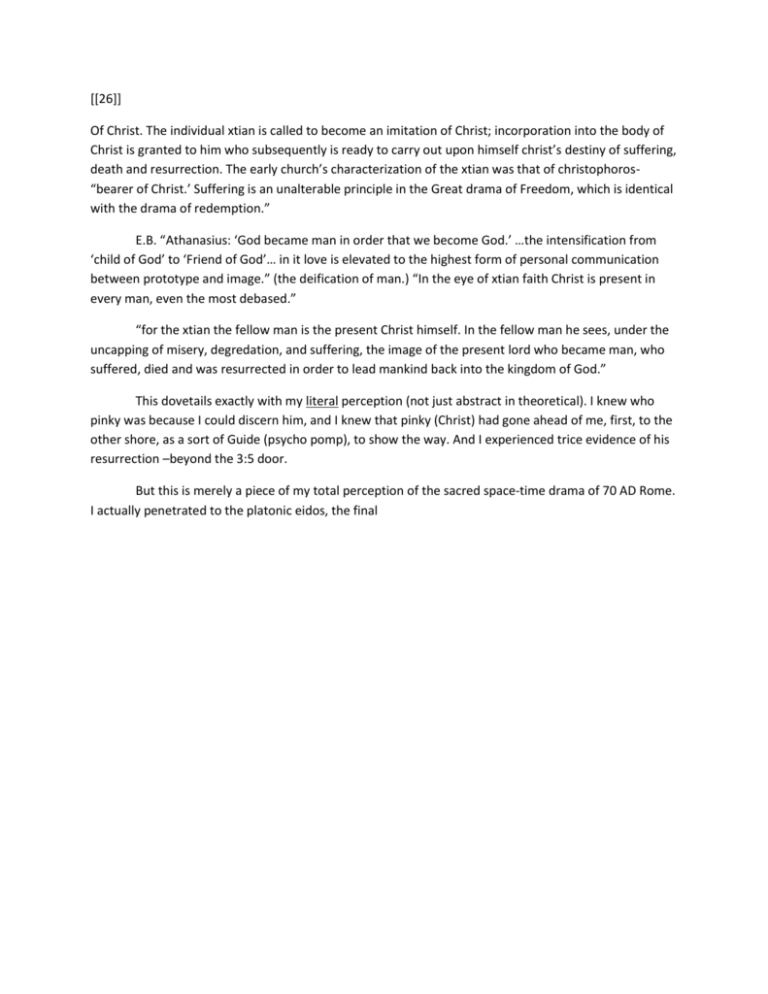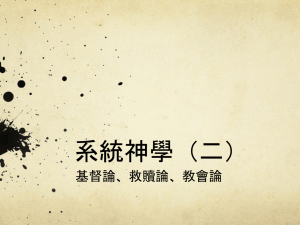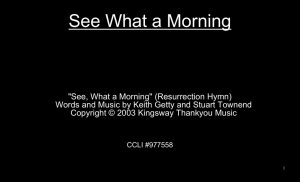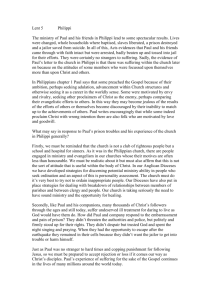Folder 29 Transcript 26
advertisement

[[26]] Of Christ. The individual xtian is called to become an imitation of Christ; incorporation into the body of Christ is granted to him who subsequently is ready to carry out upon himself christ’s destiny of suffering, death and resurrection. The early church’s characterization of the xtian was that of christophoros“bearer of Christ.’ Suffering is an unalterable principle in the Great drama of Freedom, which is identical with the drama of redemption.” E.B. “Athanasius: ‘God became man in order that we become God.’ …the intensification from ‘child of God’ to ‘Friend of God’… in it love is elevated to the highest form of personal communication between prototype and image.” (the deification of man.) “In the eye of xtian faith Christ is present in every man, even the most debased.” “for the xtian the fellow man is the present Christ himself. In the fellow man he sees, under the uncapping of misery, degredation, and suffering, the image of the present lord who became man, who suffered, died and was resurrected in order to lead mankind back into the kingdom of God.” This dovetails exactly with my literal perception (not just abstract in theoretical). I knew who pinky was because I could discern him, and I knew that pinky (Christ) had gone ahead of me, first, to the other shore, as a sort of Guide (psycho pomp), to show the way. And I experienced trice evidence of his resurrection –beyond the 3:5 door. But this is merely a piece of my total perception of the sacred space-time drama of 70 AD Rome. I actually penetrated to the platonic eidos, the final [[27]] And ultimate substrate, ontologically speaking. Everything we see is accretion over this one central drama which is perpetually (ie eternally) here, ^(1) what is involved here is pattern (Gestalt) recognition. ^(1) For me, this abrupt pattern recognition occurred through anamnesis; I could recognize because I could remember (the original gestalts which made up the drama). The military became the romans; the police Jewish spies. Other people were potentially fellow xtians, each to be sounded out. And we were joyously preparing for the bridegroom’s return –expected any moment. The whole dimension of time had shrunk down; centuries had become hours, decades minutes, millennia mere days. 2000 years passed in a few days, and now, such tiny intervals as 4 years of linear time can be judged as really being only seconds. It is another kind of time entirely, speeded up so that, as in stop action photography of sprouting seeds, furious change rates shot by, with everything moving and melding, etc. I relived my way back up to the 200 years from 70 AD to 1974 and saw all like flash cut film. And, within the blur of change, eternal forms could be distinguished: that of the joyous preparation, for His return. As I read about and study authentic xtianity I gradually learn that what I experienced wasn’t weird or strange at all, but, on the contrary, constituted the core experience of being a xtian and being redeemed or born again or receiving (becoming) Christ, only ignorance on my part prevented me from understanding the transformation, the divine alchemy at work in me. 1) the modern Slavic sophists believe Sophia to be this ideal substrate of the cosmos. [[28]] This does not prove that those who haven’t had my 3-74 experience are not true xtians; but what is a certainty to me now, four years later, is that I “became” Christ, or, more accurately, was absorbed into the cosmic corpus Christi. It all happened in 1974 the way it happened almost 200 years ago, to those of the early church. I can’t determine, however, but suspect that (as Luther said) there exists an authentic, hidden, true Christian church not the same as the above ground ones. So, because Christ suffered and died he is able to be present in and as every suffering and dying creature, as well as leading them through the 3:5 door to their resurrection; it must be a door in time. The only way he could join with them (us) was to have lived through the stages and so laid down the template. Thus he saves each creature at the instant of greatest suffering; the fusion begins with that suffering and ends with joy and release. To discern –literally perceptually discern- the presence of Christ and the enactment of the passion, discloses not one thing but two: 1) Christ is real and Christ is resurrected and is here; and 2) The person who literally sees Christ has been taken over the “narrow bridge”” to the far side, in as much for him the veil is lifted and the ledger closed. So there is inner and outer synchronization! To see externally is to have been received into the sacred world normally totally obscured by the mundane. Faith is no longer necessary and the judge has ruled on the case. All during his life the person was encountering his Lord countless times in countless ways (incidents represented very clearly in Buchman’s encounter with the black man at the gas station: the paradigm.) [[29]] Suddenly he understands. But it is too late now to rectify anything: the judge has ruled and the ledger is shut. That he did not know at the time, at all the times- he comprehends the nature of the trial and testing, the winnowing process. It is now so clear, and previously he never guessed. He played out one of the several roles. Tormentor or the tormented? It’s stressed, however, that in xtianity, in contrast to Indian Avatars, God descended and became man only once, at a particular, unique time and place. Therefore, to witness chirst purely, and not just the “reverberations,” one would have to travel backward in time and spaceially to that place: there are no plural avatars showing up in many, several, all on a few places to enlighten each country and age. The 1st advent was unique, so, in order that it can be experienced, linear time (and space, too) must be dissolved. This sprobably is accomplished through Gene-pool memory, or perhaps it’s simply a miracle: God wills it. Actually it’s analogous to the regression along the form-axis I described in “ubik.” This axis leads back ultimately to its rock-bottom stratum: the original time and place of Jesus. Which is to say, buried within all the variations and evolutions of any form lie, the pristine and unadulterated original form, regression from which is impossible. As Joe Chip thinks, “the man contains not the boy but the former man.” It’s interesting in “Ubik” that I seemed to think that the genuine, ultimate form lay in the past, not the future. But in Christ, this is so. [[30]] I did see the form regression, as an entropic process, which in the world of reality it would be. The interesting thing is that it points to a normal negentropic movement, forward in time- and yet we usually see entropy as lying ahead. 3/15 Bank: 9852.75 Adobe Drugs Mutual 22018.08 938-1144 Dentist 450 . 410-222 3320.83 2475.75 [[31]] Will Durant says that one of religion’s –any religion’s- prime functions is “to explain evil, and to find for men some scheme in which they may accept it, if not with Good cheer, then with peace of mindthis is the tast most religions have attempted to fulfill. Since the real problem of life is not suffering but undeserved suffering…” etc. The usually xtianity does not adequately do this. In fact this is where I think its Greatest failure lie,: in trying to explain undeserved suffering. But the Hindu explanation (punishment for deeds in a former life, and in that suffering is illusory – this doesn’t satisfy me: not only does the creature suffer, but he does not remember: this would be an ok explanation. What I see the most promise in is my extraordinary perceptual revelation –which I actually saw in ’74 – is that when any creature is humiliated, injured, killed, it is always Christ who mocked and murdered- the creator becomes Christ or Christ becomes the creature. [[creature Christ diagram on he middle of page 31]] Christ takes the blow. In unusual (extreme?) cases the suffering creature actually experinec. Xtian anamnesis and “remembers” who he is and how he fits in with the “passion play.” As I did, he actually sees the world stripped down to the eternal acting-out of the passion play. At this point in my exegesis my only reliable [[32]] Line of reasoning left open to me is this supernatural insight. Pinky was Christ because pinky was mocked, humiliated, kicked and killed. Whether during this, he remembered his identity I do not know. But either way the facts are the same; his becoming Christ due to and under those conditions is the archetypal situation. But why is suffering necessary at all? Why is the road to deification (transmutation into Christ) achieved in this terrible way? I turn, here, to Plato’s Timaeus and his concept of ananke. The Good God does not have complete control of the universe; the universe is part (growingly) cosmos with an irreducible chaos in the midst of it, at every level. All undeserved suffering comes from this purposeless disorder. Unable to compel ananke to not torment a given organism, the deity does the next best thing: he substitutes himself in a mysterious supernatural way for and with the doomed organism. To see or experience the literal real presence of the savior in the doomed sufferer is perhaps to have penetrated to the heart of xtianity. I witnessed it myself; I know by divine revelation and since Christ can and does become all living creatures (since all suffer undeservedly and die) he, like Brahman, is ubiquitous (immanent) in the universe, moving toward a final disclosure that the universe is only a form which God assumes, and that the ultimate [[33]] Result of trhis so-to-speak self-inflicted (unknowingly) pain on its sentient parts is to restore to those parts their memories and hence true identities they awake, remember, know, and rejoin the ingrained (“tat twam asi.”) So the unfair pressures of a unknowing causal – and casual) universe reawaken the one sleeping mind in its pluriforms. And so it encounters itself, who or what has inflicted undeserved pain on who or what? God as creator on God as son. And the 3rd member of the trinity, the Holy spirit, is the agent which effects all this “blitz” on catalyst of remembering. The jolt to remember lies in the very quality of the undeserved; puzzled and horrified by this undeservedness, the organism must search for and must find not just an answer but the answer. It becomes the sole key problem, and he knows that the key to everything lies in it. If he can grasp the meaning of this he will possess all meaning. I did not [[wish]] out my “divine substitution” view theoretically –or a prime-; I saw it. Lived it through revelation from the deity. I saw that suffering (undeserved) could not be avoided (again timaeus), but I also saw the most beautiful and touching mystery of all” the bringing into being by this crashing process the Redeemer Himself. If I forget or reject this revelation I will have exhausted all possibilities, I had only one revelation, and only by revelation does the answer come. [[34]] No amount of a prior reasoning and empirical observation (sans revelation initiated by God) will do it. As Barth in otto pointed out (vi Calvin) our reason is impaired; we cannot discern the answer: God must tear away the veil for us. Interestingly, the E.B. says at this perception of Christ’s presence “under the wrappings of degradation and misery” in one’s fellow man that it is the great xtian mystical miracle, the great understanding. It is not just an aspect of xtianity: No! Christ is actually seen – seen as alive (risen) and here with us, invisibly so until now at this moment in which the veil of illusion is torn away and ontology replaces mere appearances. The viewer is restored to his Good Friend – and oh, the love: on Christ’s part for us (shown by his doing this over and over again, eternally and ubiquitously), and our love for him, partly because we understand what he has done, and partly because now through anamnesis we remember what it was like when originally we had him with us. Before the temporary separation (Because of his death). Another aspect. I at the ultimate moment of our paid we remember who we are- well, we (he) came back here voluntarily; we did, all of us, even though we had/have forgotten. This makes more sense to me than saying we did something bad in a former life to deserve it. And the reason why we returned, knowing what our fate here would be? I appeal to the argument of God’s plan. It –our voluntary return has to do with our knowledge of it and desire to act out meaningful roles in [[35]] It. Even though we had our long term (ie trans-incantation) memories blocked, we have tasks to perform; some vast entelechy is taking final stroke. I say “we,” but at the moment of anamnesis the “we” vanishes and only the “I” remains, the total “I.” the defication of the mundane world: the holy manifesting itself in the trash of the gutter. This is the kingdom of God- and it became [perceived] here. Then, too, I must remember the fate-breaking power of Christ, the freeing from “the deterministic script.” Here ananke would be regarded as necessity, even if Plato did not so constrive it. CCertainlythe Greeks were aware of Destiny or Fate via Baylonia. And for sure the GraecoRoman mystery religions – and xtianity- were. (Moira) In connection with this I must bear in mind my decisive revelation about “the y are responsible for Lower level decision which can be overruled.” Maybe the solution is to conceive of two levels: the lower random and deterministic, the upper sentient. Also, there is a sacred or holy realic which intrudes in our mundane realm –esp. in the form of assisting and guiding information, emanating obviously from some sentient entity such as the logos, since we normally receive these messages only subliminally, we are not aware of how much, how well and how often we are helped. So any description or measurement of the amount and kind of help we receive must contain an x factor.









